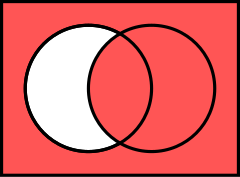Difference between revisions of "Charles Elkan"
GerdIsenberg (talk | contribs) (Created page with "'''Home * People * Charles Elkan''' FILE:CElkan.jpg|border|right|thumb|link=http://cseweb.ucsd.edu/~elkan/| Charles Elkan <ref>[http://cseweb.ucsd.edu/~e...") |
GerdIsenberg (talk | contribs) |
||
| Line 12: | Line 12: | ||
[[FILE:Venn1011.svg|border|right|thumb|240px|Implication]] | [[FILE:Venn1011.svg|border|right|thumb|240px|Implication]] | ||
| − | In 1993 Elkan identified a ''paradox'' that [https://en.wikipedia.org/wiki/Fuzzy_logic#Fuzzy_logic_operators fuzzy logic | + | In 1993 Elkan identified a ''paradox'' that [https://en.wikipedia.org/wiki/Fuzzy_logic#Fuzzy_logic_operators fuzzy logic operators] (min, max, 1-x) applied to the equation of two re-expressions of the [https://en.wikipedia.org/wiki/Material_implication_(rule_of_inference) material implication] a → b |
~(a & ~b) = (~a & ~b) | b | ~(a & ~b) = (~a & ~b) | b | ||
that is | that is | ||
1 - max(a, 1-b) = max(min(1-a, 1-b), b) | 1 - max(a, 1-b) = max(min(1-a, 1-b), b) | ||
| − | is not true | + | is not true if a < b < 0.5. |
=Selected Publications= | =Selected Publications= | ||
| Line 34: | Line 34: | ||
==2000 ...== | ==2000 ...== | ||
* [[Charles Elkan]] ('''2001'''). ''The Foundations of Cost-Sensitive Learning''. [[Conferences#IJCAI|IJCAI 2001]] | * [[Charles Elkan]] ('''2001'''). ''The Foundations of Cost-Sensitive Learning''. [[Conferences#IJCAI|IJCAI 2001]] | ||
| − | * [[Charles Elkan]] ('''2001'''). ''Paradoxes of fuzzy logic, revisited''. [https://dblp.uni-trier.de/db/journals/ijar/ijar26.html International Journal of Approximate Reasoning, Vol. 26], No. 2 | + | * [[Charles Elkan]] ('''2001'''). ''Paradoxes of fuzzy logic, revisited''. [https://dblp.uni-trier.de/db/journals/ijar/ijar26.html International Journal of Approximate Reasoning, Vol. 26], No. 2, [http://citeseerx.ist.psu.edu/viewdoc/summary?doi=10.1.1.20.7605 CiteSeerX] |
* [[Mathematician#ETrillas|Enric Trillas]], [[Mathematician#CAlsina|Claudi Alsina]] ('''2001'''). ''Comments to "Paradoxes of fuzzy logic, revisited"''. [https://dblp.uni-trier.de/db/journals/ijar/ijar26.html International Journal of Approximate Reasoning, Vol. 26], No. 2, [https://core.ac.uk/download/pdf/82697342.pdf pdf] | * [[Mathematician#ETrillas|Enric Trillas]], [[Mathematician#CAlsina|Claudi Alsina]] ('''2001'''). ''Comments to "Paradoxes of fuzzy logic, revisited"''. [https://dblp.uni-trier.de/db/journals/ijar/ijar26.html International Journal of Approximate Reasoning, Vol. 26], No. 2, [https://core.ac.uk/download/pdf/82697342.pdf pdf] | ||
* [[Mathematician#ETrillas|Enric Trillas]], [[Mathematician#CAlsina|Claudi Alsina]] ('''2001'''). ''Elkan's theoretical argument, reconsidered''. [https://dblp.uni-trier.de/db/journals/ijar/ijar26.html International Journal of Approximate Reasoning, Vol. 26], No. 2, [https://core.ac.uk/download/pdf/81951492.pdf pdf] | * [[Mathematician#ETrillas|Enric Trillas]], [[Mathematician#CAlsina|Claudi Alsina]] ('''2001'''). ''Elkan's theoretical argument, reconsidered''. [https://dblp.uni-trier.de/db/journals/ijar/ijar26.html International Journal of Approximate Reasoning, Vol. 26], No. 2, [https://core.ac.uk/download/pdf/81951492.pdf pdf] | ||
Latest revision as of 21:33, 20 July 2019

Charles Elkan [1]
Charles Elkan,
an American mathematician, computer scientist and professor in the computer science and engineering department at University of California, San Diego.
His research interests include machine learning, neural networks, fuzzy logic, data mining, and analytics.
In 1989, Charles Elkan applied conspiracy numbers to theorem proving [2],
similar to Victor Allis' Proof-number search algorithm.
Contents
Fuzzy Paradox
In 1993 Elkan identified a paradox that fuzzy logic operators (min, max, 1-x) applied to the equation of two re-expressions of the material implication a → b
~(a & ~b) = (~a & ~b) | b
that is
1 - max(a, 1-b) = max(min(1-a, 1-b), b)
is not true if a < b < 0.5.
Selected Publications
1988 ...
- Charles Elkan, David McAllester (1988). Automated Inductive Reasoning about Logic Programs. 5. ICLP / SLP
- Charles Elkan (1989). Conspiracy Numbers and Caching for Searching And/Or Trees and Theorem-Proving. IJCAI 1989, pdf
1990 ...
- Charles Elkan (1990). Incremental, Approximate Planning. AAAI 1990
- Charles Elkan (1991). Adaptive Database Locking. Ph.D. thesis, Cornell University, advisor Prakash Panangaden
- Charles Elkan (1993). The Paradoxical Success of Fuzzy Logic. AAAI 1993, AAAI93-104.pdf
- Charles Elkan (1994). Elkan's Reply: The Paradoxical Controversy over Fuzzy Logic. IEEE Expert, Vol. 9, No. 4
- Charles Elkan (1994). The Paradoxical Success of Fuzzy Logic. IEEE Expert, Vol. 9, No. 4
- Alberto Maria Segre, Charles Elkan (1994). A High-Performance Explanation-Based Learning Algorithm. Artificial Intelligence, Vol. 68, Nos. 1-2
- Charles Elkan (1996). Reasoning about Unknown, Counterfactual, and Nondeterministic Actions in First-Order Logic. Canadian Conference on AI 1996, LNCS, Vol. 1081, Springer
- Alberto Maria Segre, Geoffrey J. Gordon, Charles Elkan (1996). Exploratory Analysis of Speedup Learning Data Using Epectation Maximization. Artificial Intelligence, Vol. 85, Nos. 1-2
2000 ...
- Charles Elkan (2001). The Foundations of Cost-Sensitive Learning. IJCAI 2001
- Charles Elkan (2001). Paradoxes of fuzzy logic, revisited. International Journal of Approximate Reasoning, Vol. 26, No. 2, CiteSeerX
- Enric Trillas, Claudi Alsina (2001). Comments to "Paradoxes of fuzzy logic, revisited". International Journal of Approximate Reasoning, Vol. 26, No. 2, pdf
- Enric Trillas, Claudi Alsina (2001). Elkan's theoretical argument, reconsidered. International Journal of Approximate Reasoning, Vol. 26, No. 2, pdf
- Greg Hamerly, Charles Elkan (2002). Alternatives to the k-means algorithm that find better clusterings. CIKM 2002, pdf [5]
- Greg Hamerly, Charles Elkan (2003). Learning the k in k-means. NIPS 2003, pdf
- Charles Elkan, Keith Noto (2008). Learning classifiers from only positive and unlabeled data. KDD 2008, pdf
2010 ...
- Charles Elkan (2011). Reinforcement Learning with a Bilinear Q Function. EWRL 2011
- Zachary Lipton, Charles Elkan (2015). Efficient Elastic Net Regularization for Sparse Linear Models. arXiv:1505.06449
- Zachary Lipton, John Berkowitz, Charles Elkan (2015). A Critical Review of Recurrent Neural Networks for Sequence Learning. arXiv:1506.00019v4
- Zachary Lipton, David C. Kale, Charles Elkan, Randall C. Wetzel (2015). Learning to Diagnose with LSTM Recurrent Neural Networks. arXiv:1511.03677
- Clifford Champion, Charles Elkan (2017). Visualizing the Consequences of Evidence in Bayesian Networks. arXiv:1707.00791
- Rashmi Gangadharaiah, Balakrishnan Narayanaswamy, Charles Elkan (2017). What we need to learn if we want to do and not just talk. HLT-NAACL 2018, pdf
External Links
References
- ↑ Homegage - Charles Elkan
- ↑ Charles Elkan (1989). Conspiracy Numbers and Caching for Searching And/Or Trees and Theorem-Proving. IJCAI 1989, pdf
- ↑ dblp: Charles Elkan
- ↑ Charles Elkan - Selected publications
- ↑ k-means clustering from Wikipedia
